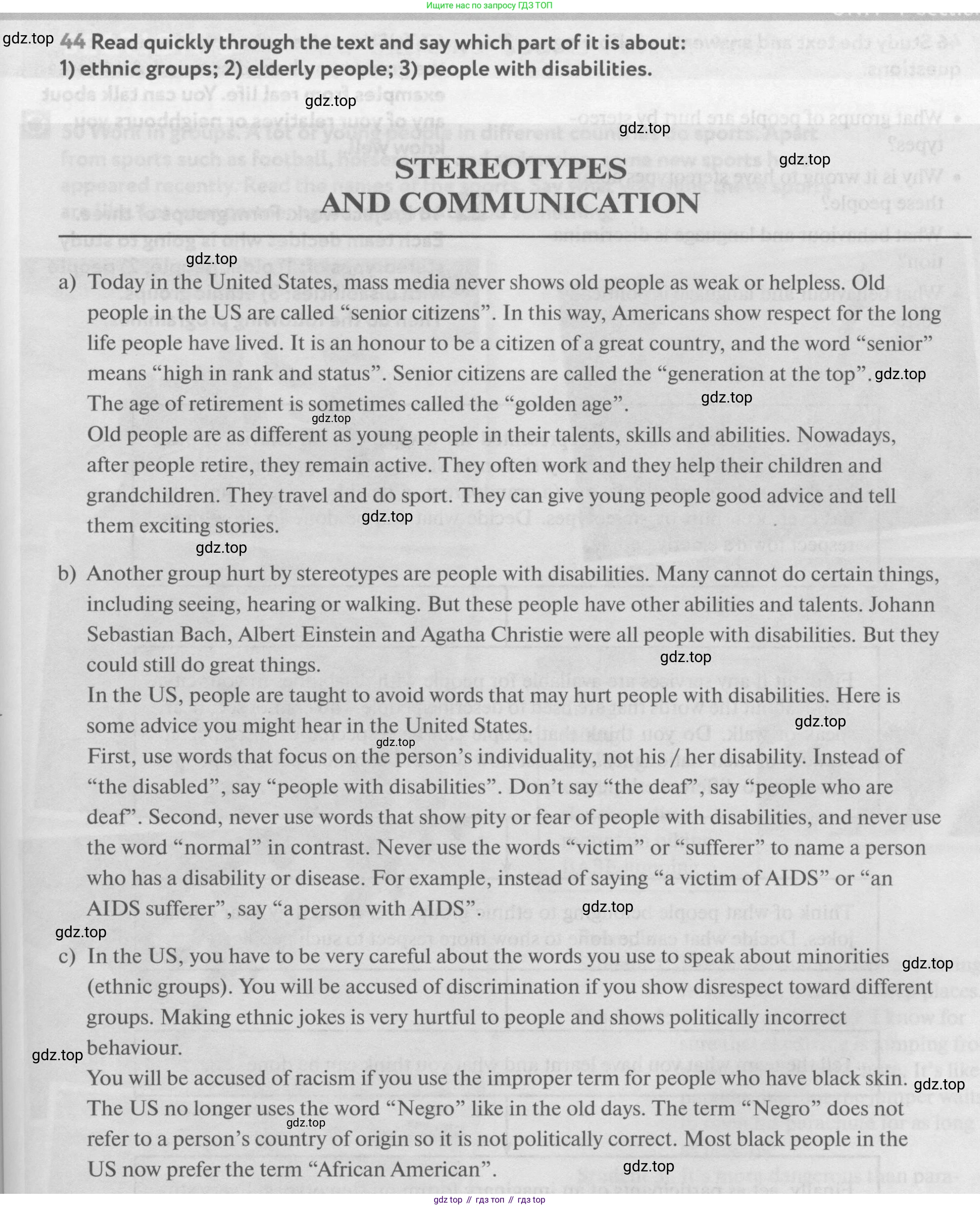Номер 44, страница 163 - гдз по английскому языку 9 класс (enjoy english) учебник Биболетова, Бабушис

Авторы: Биболетова М. З., Бабушис Е. Е., Кларк О. И., Морозова А. Н.
Тип: Student's book (Учебник)
Серия: enjoy english (английский с удовольствием)
Издательство: Просвещение, Аст-Астрель
Год издания: 2016 - 2025
Цвет обложки: бирюзовый, синий
ISBN: 978-5-17-090258-3, 978-5-271-47224-4
Популярные ГДЗ в 9 классе
Unit 4. Make your choice, make your life. Section 2. Why are stereotypes harmful? - номер 44, страница 163.
№44 (с. 163)
Условие. №44 (с. 163)
скриншот условия

44 Read quickly through the text and say which part of it is about:
1) ethnic groups; 2) elderly people; 3) people with disabilities.
STEREOTYPES
AND COMMUNICATION
a) Today in the United States, mass media never shows old people as weak or helpless. Old people in the US are called “senior citizens”. In this way, Americans show respect for the long life people have lived. It is an honour to be a citizen of a great country, and the word “senior” means “high in rank and status”. Senior citizens are called the “generation at the top”. The age of retirement is sometimes called the “golden age”. Old people are as different as young people in their talents, skills and abilities. Nowadays, after people retire, they remain active. They often work and they help their children and grandchildren. They travel and do sport. They can give young people good advice and tell them exciting stories.
b) Another group hurt by stereotypes are people with disabilities. Many cannot do certain things, including seeing, hearing or walking. But these people have other abilities and talents. Johann Sebastian Bach, Albert Einstein and Agatha Christie were all people with disabilities. But they could still do great things. In the US, people are taught to avoid words that may hurt people with disabilities. Here is some advice you might hear in the United States. First, use words that focus on the person’s individuality, not his / her disability. Instead of “the disabled”, say “people with disabilities”. Don’t say “the deaf”, say “people who are deaf”. Second, never use words that show pity or fear of people with disabilities, and never use the word “normal” in contrast. Never use the words “victim” or “sufferer” to name a person who has a disability or disease. For example, instead of saying “a victim of AIDS” or “an AIDS sufferer”, say “a person with AIDS”.
c) In the US, you have to be very careful about the words you use to speak about minorities (ethnic groups). You will be accused of discrimination if you show disrespect toward different groups. Making ethnic jokes is very hurtful to people and shows politically incorrect behaviour. You will be accused of racism if you use the improper term for people who have black skin. The US no longer uses the word “Negro” like in the old days. The term “Negro” does not refer to a person’s country of origin so it is not politically correct. Most black people in the US now prefer the term “African American”.
Решение. №44 (с. 163)

Решение 2. №44 (с. 163)
44 Быстро прочитайте текст и скажите, какая его часть о: 1) этнических группах; 2) пожилых людях; 3) людях с ограниченными возможностями.
Ответ:
1) Part c) of the text is about ethnic groups.
(Часть c) текста об этнических группах.)
2) Part a) of the text is about elderly people.
(Часть a) текста о пожилых людях.)
3) Part b) of the text is about people with disabilities.
(Часть b) текста о людях с ограниченными возможностями.)
Другие задания:
Помогло решение? Оставьте отзыв в комментариях ниже.
Присоединяйтесь к Телеграм-группе @top_gdz
ПрисоединитьсяМы подготовили для вас ответ c подробным объяснением домашего задания по английскому языку за 9 класс, для упражнения номер 44 расположенного на странице 163 к Учебник (Student's book) серии английский с удовольствием , enjoy english 2016 года издания для учащихся школ и гимназий.
Теперь на нашем сайте ГДЗ.ТОП вы всегда легко и бесплатно найдёте условие с правильным ответом на вопрос «Как решить ДЗ» и «Как сделать» задание по английскому языку к упражнению №44 (с. 163), авторов: Биболетова (Мерем Забатовна), Бабушис (Елена Евгеньевна), Кларк (Ольга Игоревна), Морозова (Алевтина Николаевна), учебного пособия издательства Просвещение, Аст-Астрель.















